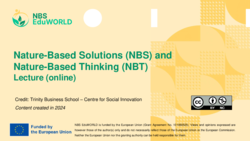
Learning Units
Search results ( 26 - 30 of 50 )
Nature-Based Solutions and Nature-Based Thinking
As urban communities face immense environmental challenges, NBS in isolation is not generating traction on its own. Nature-Based Thinking (NBT) is enabling a change in mindset for key stakeholders, shifting from a solutionist approach to a systemic one involving multiple interventions and engagement by partners and NBS. This Learning Unit introduces the concept of NBT, how it involves communities, institutions/organisations and nature/ecological processes to reconceptualise human-nature-organisational relationships. It challenges learners to reflect on how communities can relate in new ways to nature, new modes of governing and taking long-term, sustainable management of NBS.
Find here the editable version and the teaching note.
Educational Level: Higher Education
Language: English
Organisation: TCD

NBS community project management
This Learning Unit introduces the essential action areas for effectively managing NBS community projects: how to develop project intervention logic, engage stakeholders, ensure project sustainability, and measure impact. Interactive activities allow learners to practive the application of these actions on hypothetical scenarios of NBS projects.
Find here the editable version and the teaching note.
Educational Level: Professional
Language: English
Organisation: PPMI

NBS for Disaster Management and Resilience in Coastal Communities
This learning unit situates NBS in the context of disaster mitigation, management and the resilience of coastal communities. Learners can critically consider the role of NBS for flooding, coastal erosion and other coastal challenges due to climate change. The critical role of women in disaster mitigation, response and recovery offer a platform for analyzing these concepts.
Find here the editable version and the teaching note.
Educational Level: Higher Education
Language: English
Organisation: TCD

NBS In and Out Lab
NBS In And Out Lab is an educational hands-on activity that aims to promote NBS through education outside the classroom, and is directly linked to the established curriculum. This adopts a student-centered pedagogical model, the Student Focus Approach, that is based on socio-constructivist approach: students’ own activity, their prior knowledge, peer-collaboration and learning together. This can be incorporated into STEAM or other multidisciplinary science (biology, chemistry, physics and other subjects) lessons or projects. This learning unit Is developed for learners who are studying education, teachers and those interested in educating young people about NBS.
Find here the editable version and the teaching note.
Educational Level: Professional
Language: English
Organisation: TCD

Pitching for Nature-Based Enterprises
Pitching is a vital skill for a nature-based enterprise to master if conventional investors are to be convinced of its value and invest. This learning unit will empower the learner to understand the art of pitching for investment. In this unit, participants will learn the core elements of a successful pitch and be equipped with tips and tricks to avoid some of the most common pitfalls when pitching. By the end of this learning unit, the participant will have the necessary know-how to develop content for their own pitch deck.
Find here the editable version and the teaching note.
Educational Level: Professional
Language: English
Organisation: Horizon Nua


Funded by the European Union. Views and opinions expressed are however those of the author(s) only and do not necessarily reflect those of the European Union or the European Commission. Neither the European Union nor the granting authority can be held responsible for them.